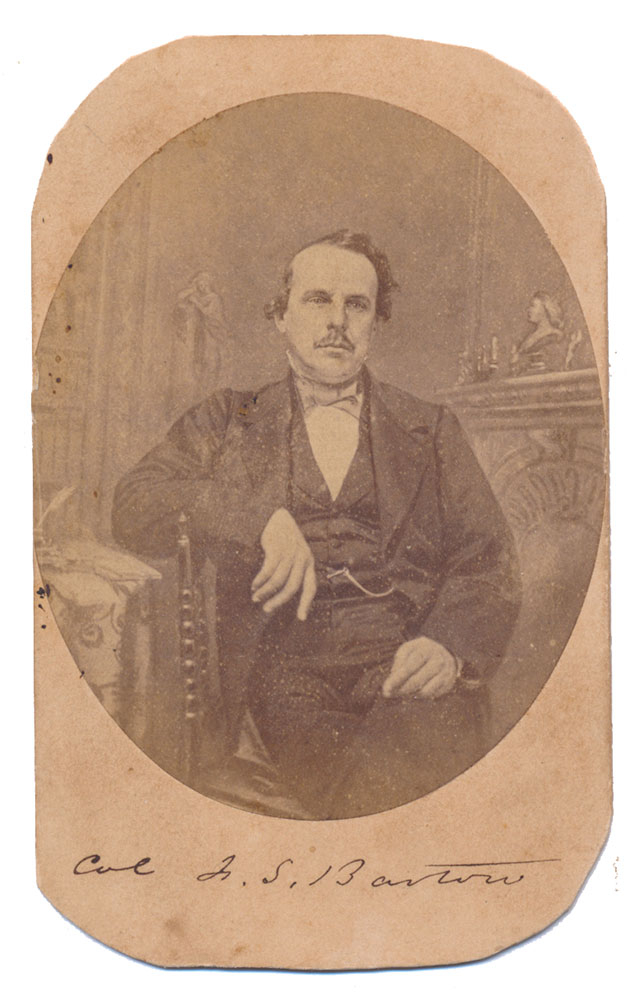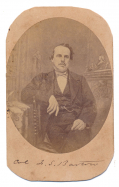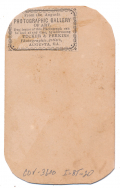site search
online catalog
CDV OF COLONEL FRANCIS STEBBINS BARTOW, THE FIRST COMMANDER KILLED IN BATTLE DURING THE CIVIL WAR AT FIRST MANASSAS

$1,200.00 SOLD
Quantity Available: None
Item Code: 846-584
Here we have a view of Colonel Bartow in civilian clothing, likely around 1860 when Bartow was a congressman for his home state of Georgia. The image is an oval shaped vignette of Bartow seated in a parlor. The image is affixed to a plain mount with trimmed and rounded corners. An ink imprint of “Col F.S. Bartow” is present below the image.
A photographer’s label for the “Augusta Photographic Gallery of Art / Tucker & Perkins / Photographic Artists, / Augusta, GA” is present in the upper left-hand corner on the back of the image. The modern pencil catalog number “CDV – 3600 / I-BT-20” denotes that this image was once part of the Bill Turner portion of the Ray Richey collection of images.
Overall, this image is in good condition despite its trimmed corners. There is some minor ink spotting on the left-hand margin on the front of the image and some surface dirt throughout with minor age toning as expected. The reverse shows minor surface dirt and some light spots of foxing.
Born in Savannah on September 6, 1816 to Frances Lloyd Stebbins and Theodosius Bartow, Francis Stebbins Bartow would grow to become an attorney and politician. Bartow began his career at the University of Georgia and then attended Yale Law School. After graduating, he returned to his home state and began practicing law with John Berrien, a Georgia senator and attorney general of the United States from 1829-1831. In 1844, Bartow married Louisa Berrien, John’s daughter, which clearly enabled Bartow’s political career. He served two terms in the House of Representatives and one term as a senator.
Bartow was a proponent of secession and campaigned for a new nation that would thrive on the economy of slavery. He was part of the secession convention and when Georgia did secede in January 1861, he was elected to the Provisional Confederate Congress. Bartow also chaired the military affairs committee.
In 1856 Bartow was elected captain of the Oglethorpe Light Infantry, a Savannah militia unit, which Bartow would lead in capturing Fort Pulaski in 1861. When the war broke out in April, Bartow took the Oglethorpe Light Infantry to the field in Virginia with state owned muskets, a circumstance which the Governor of Georgia did not appreciate. After a heated series of letters, Bartow told the governor in so many words that he did not have time for his non-sense. Bartow famously said “I go to illustrate, if I can, my native state,” another phrase which would adorn his final resting place. Once the Oglethorpes arrived, Bartow took command as colonel of the 8th Georgia. Less than four months later, during a brash charge against Union artillery, Bartow was killed.
After his death, Bartow’s body was returned to Savannah, where he was buried in the family plot. Colonel Bartow’s headstone bears his last words: “They have killed me boys but never give it up.” [cla][ph:L]
~~~~~~~~~~~~~~~~~~~~~~~~~~~~~~~~~~~
THIS ITEM, AS WITH ALL OTHER ITEMS AVAILABLE ON OUR WEB SITE,
MAY BE PURCHASED THROUGH OUR LAYAWAY PROGRAM.
CLICK HERE FOR OUR POLICIES AND TERMS.
THANK YOU!
Inquire About CDV OF COLONEL FRANCIS STEBBINS BARTOW, THE FIRST COMMANDER KILLED IN BATTLE DURING THE CIVIL WAR AT FIRST MANASSAS
For inquiries, please email us at [email protected]
Most Popular
Historical Firearms Stolen From The National Civil War Museum In Harrisburg, Pa »
Theft From Gravesite Of Gen. John Reynolds »
Selection Of Unframed Prints By Don Troiani »
Fine Condition Brass Infantry Bugle Insignia »
British Imported, Confederate Used Bayonet »
Scarce New Model 1865 Sharps Still In Percussion Near Factory New »
featured item
RARE CIVIL WAR “SURGEON’S COMPANION” OR “U.S. ARMY MEDICINE CASE FOR FIELD SERVICE” WITH MASS VOLUNTEER MILITIA MARKINGS, LABEL, AND TINS
This scarce piece of military surgeon’s field gear is in very good condition with both the shoulder and waist belts with buckles full length, in place, and intact, as is the narrower strap buckling over the top to keep the lid closed. This follows… (766-2008). Learn More »
site search
Upcoming Events
May 16 - 18: N-SSA Spring Nationals, Fort Shenandoah, Winchester, VA Learn More »




